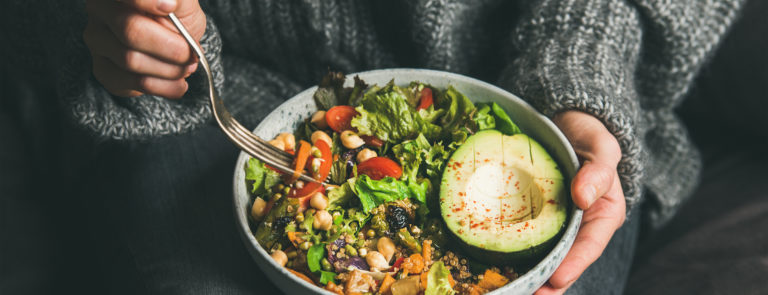Due to sustainability issues, concerns for animal welfare and health reasons, more and more people are choosing to adjust their diets to include less meat and dairy products.
But what are the differences between being a vegan and being a flexitarian. And which is better for you?
What can you eat as a vegan?
A vegan diet is one that contains only plants, such as vegetables, grains, nuts and fruits and any foods which are made from plants.
Vegans do not eat any foods that are derived from animals or that use animals in their production. This includes any dairy products and eggs.
1 And for many vegans, also honey (as it is produced by bees).
Vegans also do not eat anything derived from meat, such as gelatine and they avoid fish and shellfish.
2
What are the benefits of a vegan diet?
One of the main and most important benefits of a vegan diet is that it avoids the exploitation of animals. It is also a great way of lowering your carbon footprint and living a greener life.
3
A balanced vegan diet could be one of the healthiest diets to follow.
This is because vegan food is higher in fruit, vegetables and legumes than most diets and there are lots of health benefits from this. Vegans also consume less saturated fat, which usually comes from animal products.
4
Vegan meals and
vegan snacks have lots of heart-friendly nutrients such as folate, vitamin C, vitamin E, potassium, magnesium and unsaturated fat.
And because a vegan diet is full of fibre and naturally satisfying, it tends to be lower calorie and more effective for weight management.
5
Are there any drawbacks to a vegan diet?
Vegans may sometimes find it a challenge to get enough calcium, iron and vitamin B12 through their plant-based diets.
6
And so, if you are considering becoming vegan, it is important to ensure that you plan your meals carefully, to ensure that all your nutrients are covered.
You can find calcium in fortified soy milk, broccoli and almonds; iron in soy nuts, kale and spinach; and vitamin B12 in fortified soy milk, fortified orange juice and fortified cereals.
7
You may also wish to take some supplements to top up your nutrient intake.
What is a flexitarian?
Flexitarian is also known as casual vegetarianism.
It is a diet which is mostly vegetarian but allows for the occasional meat dish.
8
It has become increasingly popular recently, with 14% of people defining themselves as flexitarian.
9
Why follow a flexitarian diet?
Most people decide to follow a flexitarian diet as the reduced meat consumption may reduce your carbon footprint, as well as improving your health.
It is a more environmentally sustainable approach to eating, which reduces meat consumption by choosing to eat alternative sources of protein instead.
10
What are the benefits of a flexitarian diet?
One of the
benefits of a flexitarian diet is that it may contain more nutrients.
A flexitarian diet means there is an increase in plant-based meals. Flexitarians may add more lentils, beans, peas, nuts and seeds into their diets.
These are all excellent sources of plant-based protein and are also full of soluble fibre.
11
Protein is essential for the growth and maintenance of muscles and it is especially important that you get a good amount of protein if you like to work out, or live an active lifestyle.
Soluble fibre can help to reduce cholesterol levels as well as keeping you feeling fuller for longer. This can help to reduce your snack cravings as well as the risks of overeating and making unhealthy choices at mealtimes.
Soluble fibre also helps to support a healthy digestive system, by helping to reduce digestive issues such as constipation and diarrhoea.
12
One helpful benefit to a flexitarian diet is the flexibility that gives it its name.
Your body can often give some indication as to what it is craving and so if you feel like you really need something which contains dairy or meat, you can occasionally add this into your diet.
Which is better – a vegan or a flexitarian diet?
The two diets can be quite similar and both have lots of benefits. So it is difficult to compare and contrast the two, in order to say which is better.
If you decide to become either a vegan or a flexitarian, your decision should be based on your lifestyle.
It may be that you would like to go fully vegan one day and so you become a flexitarian first, to start to get used to a more plant-based diet.
Shop Vegan Food & Drink
Last updated: 18 December 2020
Sources
1
https://www.nhs.uk/live-well/eat-well/the-vegan-diet/
2
https://www.bbcgoodfood.com/howto/guide/vegan-diet-healthy
3
https://www.vegansociety.com/go-vegan/why-go-vegan
4
https://www.bbc.com/future/article/20200122-are-there-health-benefits-to-going-vegan
5
https://www.bbcgoodfood.com/howto/guide/vegan-diet-healthy
6
https://www.nhs.uk/live-well/eat-well/the-vegan-diet/
7
https://www.health.harvard.edu/staying-healthy/is-a-vegetarian-or-vegan-diet-for-you
8
https://www.bbcgoodfood.com/howto/guide/what-flexitarian-diet
9
https://www.marketingweek.com/flexitarianism-transforming-consumers-eating/
10
https://www.bbcgoodfood.com/howto/guide/what-flexitarian-diet
11
https://www.bbcgoodfood.com/howto/guide/what-flexitarian-diet
12
https://www.webmd.com/diet/features/insoluble-soluble-fiber



